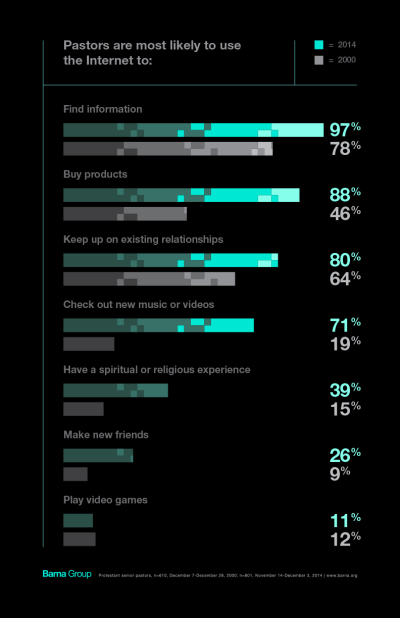Cyber church

VENTURA, Calif. (Christian Examiner) -- More pastors are seeing the internet as an essential tool according to a new Barna Group study. The data is unsurprising, but demonstrates a dramatic shift in perception from 2000 when the technology served mostly to enhance ministry.
The new report compared how Protestant church leaders used the Internet in 2000 versus 2014. Research by the private, non-partisan organization showed overall, pastors were using the Internet 39 percent more today compared to 24 percent in 2000, and for more reasons. Additionally, more than half (54 percent) agreed that the Internet is a powerful tool for effective ministry and a similar percentage (55 percent) said the church required a significant Internet presence.
"Increased use and acceptance of the Internet in ministry will come as little surprise to anyone," says Roxanne Stone, a vice president at Barna Group, a private, non-partisan organization known for conducting research. "While 15 years ago, having a church website or using the Internet as a ministry tool may have seemed like a luxury, for most churches today it has become a necessity."
The study surveyed by telephone 610 Protestant pastors from December 7 to December 28, 2000 and 601 Protestant pastors in November 14 to December 3, 2014.
Significant areas of increased Internet use included the the top reasons pastors sought the Internet in 2000 -- to find information (97 percent today compared to 78 percent) and to keep up with existing relationships (80 percent compared to 64 percent).
Other dramatic increases since the 2000 study included using the Internet for email (46 percent of pastors today compared to 24 before); product purchase (88 percent compared to 46 percent); checking out new music or videos (71 percent compared to 19 percent), and making new friends (26 percent compared to 9 percent).
While most pastors expressed the Internet was a good tool versus something negative the most resistance was seen from older pastors. For example, 72 percent of Millennial pastors agreed the Internet was a powerful tool for effective ministry while only 56 percent of Gen-Xers, 54 percent of Boomers and 39 percent of Elders agreed.
The report also indicated pastors who made more than $60,000 annually (63 percent) saw the Internet as a powerful tool versus the 49 percent who made less than $40,000.
Also of note were pastors' use of the Internet to have a spiritual or religious experience (39 percent compared to 15 percent) and their willingness to see it as a tool "for facilitating religious experiences among their congregants.
The report stated today, nearly nine in 10 pastors (compared to seven in 10 in 2000) expressed it is "theologically acceptable" for a church to provide "faith assistance or religious experiences" via the Internet.
Another telling factor of the digital age experienced by the increasingly cyber church, research showed that today almost all, or 96 percent, of pastors use a computer at church, up 13 percent from 2000.
While the primary reason for pastors to use a computer then and now continues to be word processing, additional uses today include for study helps or research (56 percent today compared to 29 in 2000) and creating slides/presentations (44 percent today compared to 10 percent in 2000).
Participating pastors were also asked whether if in the next decade some people will have all of their faith experiences through the Internet.
Though slightly more than half did not believe that people would have all of their faith experiences online within 10 years, 11 percent (versus 7 percent in 2000) believed people "definitely" would and 36 percent (versus 20 percent in 2000) said people "probably" would.
Seventeen percent of pastors said people "definitely will not" (compared to 26 percent in 2000) have all of their faith experiences online within 10 years and 34 percent (compared to 44 percent in 2000) said people "probably won't."